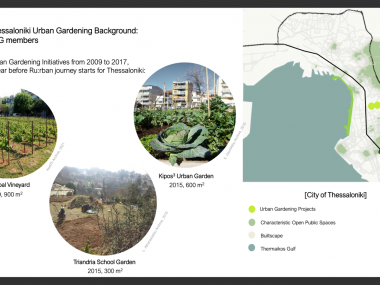THESSALONIKI TRANSFER STORY
Edited on
07 June 2021Municipality of Thessaloniki, even though it refers to a city of only 2.5m2 per resident, during the last years supports and hosts in public spaces a vineyard, an orchard, an urban community garden project (Kipos3) and a schoolyard (Triandria school garden). The existence of those productive and “edible” landscapes, within the city center, motivated the Common Benefit Enterprise of the City of Thessaloniki (KEDITH), to participate in the European network Ru:rban of URBACT III.
Through this experience, the City gained valuable input to structure an institutional tool and a manual in order to multiply its urban gardening initiatives along with the active citizens’ engagement. The rural-urban (“rurban”) blending these initiatives may bring, aims to more cohesive neighborhoods and communities, to more attractive public spaces – especially for the remnant, non accessible and inactive of those -, to a more inclusive, resilient and alive city in the end . Ioanna Kosmopoulou, President of Common Benefit Enterprise City of Thessaloniki "KEDITH"

Thessaloniki Urban Gardening Background
Thessaloniki’s Background
Population
| Urban Gardening Projects
|
Area
| |
Natural Environment
| Area
|
History
| Urban Gardeners
|
Key Challenges for Thessaloniki
Strengths
| Weaknesses
|
Opportunities
| Threats
|
Thessaloniki’s Ru:rban Focus
Kipos3 Urban Community Garden (since 2015)
- Built in 2015 in an ephemeral and pilot form
- With zero budget for the City of Thessaloniki, under private institutions’ funding for the necessary infrastructure
- In a space (600m2) – former municipal parking area -, provided by the City of Thessaloniki next to an urban vineyard an urban orchard, in the city center of the City
- It developed in 2 phases (in 2015 and 2017), to exist today under the stewardship of 30 families being an emblematic urban garden for the City
- A group of architects, landscape architects, agriculturists supported its creation and coordinated all the relevant parts (top down and bottom up) in order to obtain a sustainable form
- It operates – without vandalisms – in an open public space, easily accessible and welcoming for the surrounding neighborhood, hosting several kind of environmental, recreational and educational activities and generating a discussion about the public, open, green space qualities
- It has hosted school classes for elementary and secondary schools (collaboration with the Centre of Environmental Education of Eleftherio Kordellio), researchers, postgraduate programs, conferences, remaining a source for input about urban gardening interest in the city
- It has developed an organization structure and a set of rules to adjust issues of self maintenance, reporting to local authorities and sustainability
- It played a key role in the transformation of the surrounding residential area, exempting the spirit of an inclusive, warm and alive citizens community and contributing in the social resilience of the area in the period of the hard economic recession
- It hosts greenhouse for the reproduction of local forgotten or lost varieties, as well as a compost area. Within its borders several herbsand edible species grow in harmony and in permaculture methods
Lesson’s learned
“Gardenising”: The introduction of urban garden’s management tools (gardenising < gardens’s organising) and capacity building workshops, offered by Ru:rban, operated as a very useful input for the existing urban gardening initiatives in the City. Emphasis on practices to raise community awareness and balanced co-existence in urban gardening projects was a proof about the importance of tasks classification and leadership in any scale of a common target.
The power of the ULG Network: The ULG Network brought for the 1st time in the City the initiators of several urban gardening projects around the same table, to share experiences, concerns and visions. A common deliberation process rose up, really useful for the networking of the projects in the future
The power of the URBACT Network: For Thessaloniki, being part of a European network of sharing good practices (URBACT& Ru:rban), meant a valuable opportunity to get closer to other city with similar challenges, to perceive urban gardening under strategic lens, as well as to give value to the existing initiatives.
Institutional Tools Development: The introduction of the City to a partners’ shared regulatory framework about planning, providing, and monitoring available public spaces for the use of urban gardens, was a useful step towards the institutionalization of the urban agriculture as a land also use.
Thessaloniki’s Ru:rban Achievements
Thessaloniki’s Urban Gardens Network: The participation in Ru:rban program, meant for Thessaloniki not only an input generator, but also an opportunity to bring together the City’s forces that are engaged in urban gardening initiatives through the last decade. Representatives of 7 urban gardening initiatives of several scales, shared experiences about all the aspects of managing and sustaining in common an urban green space, an urban garden.
The URBACT Local Group (ULG) – ULG group of Ru:rban, showed an interest to sustain as a network providing feedback about urban gardens in the city, sharing good practices, encouraging new initiatives and bringing together the gardeners with the local authorities to facilitate the thriving gardening projects.
Exchanged knowledge – practices – experiences: The knowledge exchanged within the URRBACT, Ru:rban and ULG network, concerns: gardening practices, organizational models, challenges and threats about the projects sustainability, formulas of collaboration and support by the local authorities, connection with the local communities
Proposal for a regulatory city’s framework for urban gardens: Following the exemplar institutional models of Ru:rban partner cities, ULG group in Thessaloniki focused on an Urban Gardens’ Regulation proposal as a tool institutionalize all the phases of an urban garden operation: providence of space, organizational form, rights and tasks for the participants etc.
Especially Thessaloniki, recognizing the local particularities, encompassed and emphasized in the bottom –up dimension of this framework, encouraging the overview and the management of an urban garden, also by groups of natural persons, aspiring to transform the image of their neighborhood.
Urban gardening Guide: An urban gardening guide to strengthen already existing initiatives, but also allow new gardens to sprout in green spaces, roofs, balconies, and also new synergies to arise between communities
Parallel Urban Gardening Actions / Projects: The City of Thessaloniki participates in other also networks to enhance the know how about urban agriculture strategies.
Interegg CityZen is a European program about the incorporationof new technologies and innovation, as well as business models, in urban farming projects, whilst the Municipality investigates opportunities to extend urban gardening projects, through UIA or H2020.
All initiatives strengthen one another, while get consciouslyfeedback from the existing landmark urban gardening projects (Kipos3, Triandria Schoolgarden, Per.Ka, etc).
What’s Next?
Support the urban gardening network born by ULG members
- Understand and incorporate the existing good practices in a strategic formula
- Reveal the municipal resources that could assist and monitor urban
- gardening initiatives
- Encourage new initiatives, support & protect the landmarked
- Disseminated this experience through a concise campaign
- Include aspects of participatory design, community engagement, sustainable food circle, circular practices, ecologically friendly interventions, cultural and educational motivations,
- horizontally and in all levels of decision – making and planning
A City more sensitive to its natural elements capable to enforce and orchestrate its citizens’ needs visions desires capacities to support ...and the global challenges to support the sustainability and resilience of collaboratively managed green & public spaces
References
Urbact Ru:rban Thessaloniki
https://urbact.eu/thessaloniki
Thessaloniki tells us about its experience as part of the RU:RBAN network
https://www.youtube.com/watch?v=or-
Cl4bjL_s&feature=youtu.be&fbclid=IwAR1J-
W38A1nG6NKAhzqR98BD6zy2FaSChzwOpB12RoIzU0ITh4ntc9K10ig#t=1m48s
Community Enterprise, City of Thessaloniki (KEDITH)
https://www.facebook.com/kedith.thessaloniki
https://www.kedith.gr/
 Submitted by Patricia Hernandez on
Submitted by Patricia Hernandez on
